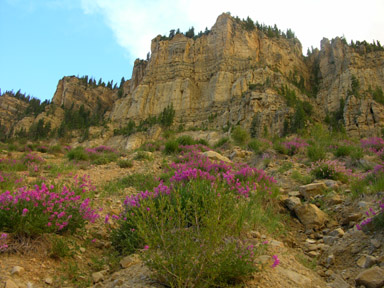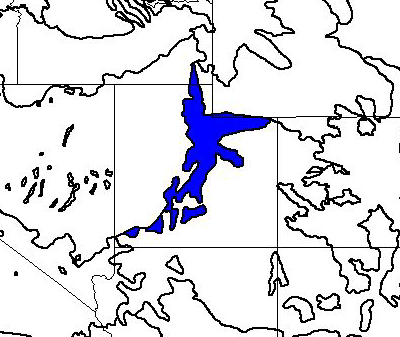
Cedar Breaks Ntl. Monument, Iron Co., Utah (c) 2005 Daniel P. Duran
Bioimages home (click on an image to enlarge)
view
this page in its intended navigation context
Wasatch and Uinta montane forests
(WWF
ecoregion NA0530)

Cedar Breaks Ntl. Monument, Iron Co., Utah
(c) 2005 Daniel P.
Duran

Source of bioregions data:
Olson, D. M. and
E. Dinerstein. The Global 200: Priority ecoregions for global conservation. (PDF
file) Annals of the Missouri Botanical Garden 89:125-126.
Distinctiveness (1=highest,4=lowest): 3 (bioregionally
outstanding)
This region contains a variety of coniferous forests. It is relatively dry
for a mountainous forest because it lies in the rain shadow of the high Sierra
Nevada mountains to the west.*
Conservation Status (1=most endangered, 5=most
intact): 2 (endangered)
Most of this region has been degraded by grazing, logging, mining, and
recreational use. Large predators are extinct in this area. Very
little of the area is protected.*
 | Pinus ponderosa | (ponderosa pine) |
 | Pseudotsuga menziesii | (Douglas fir) |
 | Abies lasiocarpa | (subalpine fir) |
 | Picea engelmannii | (Engelmann spruce) |
Pinus flexilis (limber pine)
 | Quercus gambelii | (Gambel oak) |
Associated habitats
Cedar Breaks Ntl. Monument, Iron Co., Utah

(c) 2005
Daniel P. Duran
hires
* Ricketts, T.H., E. Dinerstein, D.M. Olson, C.J. Loucks, et al. (1999) Terrestrial Ecoregions of North America: A Conservation Assessment. World Wildlife Fund - United States and Canada. Island Press, Washington, D.C. pp. 252-253.
Except as noted, images copyright 2002-2005 Steve Baskauf - Terms of use